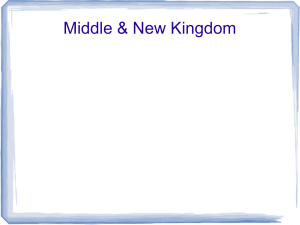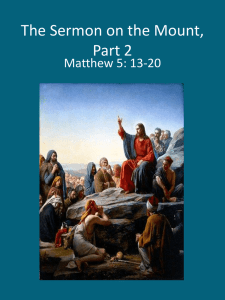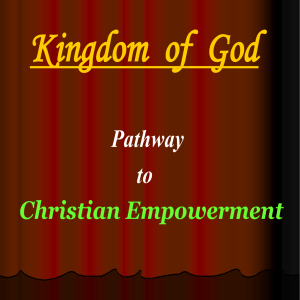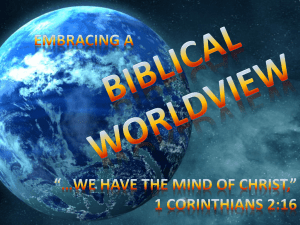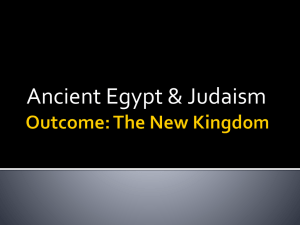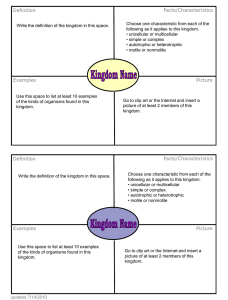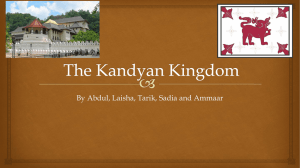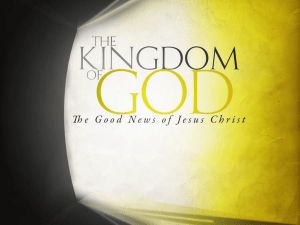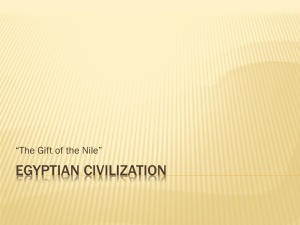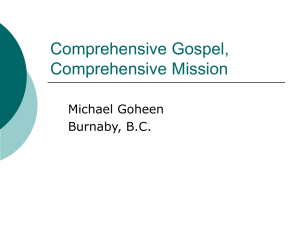Introduction to the Kingdom of God
advertisement
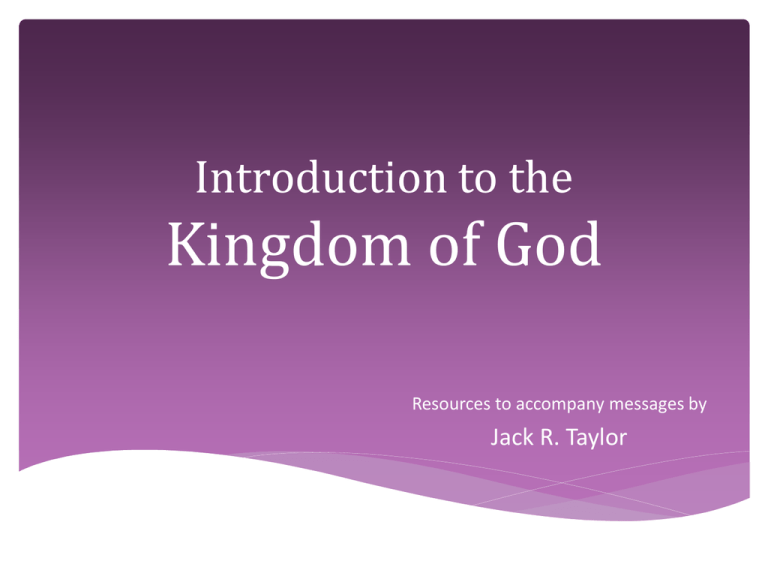
Introduction to the Kingdom of God Resources to accompany messages by Jack R. Taylor Opening Statements: There has never been, nor will there ever be on earth, a subject more valuable to consider than that of the eternal Kingdom of God. In the coming study we will ask questions, observe principles and draw conclusions vital to our lives and every life on Planet Earth. The truths here discovered, believed and applied will be a source of hope and peace to all who embrace them both here and hereafter. More Opening Statements: The Kingdom of God is present on every page of Scripture from Genesis 1:1 to Revelation 22:21. Where it is not identified and named, it is assumed and declared in the context. It is thus to be given priority in keeping with its wide array of mentions in the Bible. It is what is on the heart of God at this present moment. Still, More Opening Statements: The very mention of the Kingdom of God suggests that somebody is in charge of everything and that Somebody is God. That fact jumps off the page near the middle of your bible: “The Lord has established His throne in heaven and His Kingdom rules over all.” (Psalm 103:19) This word is to be the fixed point of all our subsequent considerations for the remainder of our time together. Questions to Consider: What kind of world do we live in? What kind of universe? Why so much trouble, hate and confusion in our world? Why have wars been waged 3,700 of the last 4,000 years? Why do we not learn better ways to manage the planet? More Questions to Consider: Why have not man’s scientific advances and intellectual pursuits been able to solve the problems of the planet? What hope, if there is one, is there for our world? Just before you give up and sink into a sea of depression, I declare, “There is one and only one hope, THE KINGDOM OF GOD.” Herein is the value of our study! A Brief Survey of the Kingdom in the Bible The first book, Genesis, explains the who’s, the how’s and why’s of the Kingdom: God and Creation Man and the creation intention Man and the Fall God and His plan of redemption Promises and coming of Jesus A Brief Survey of the Kingdom in the Bible (continued) “No One who has ever lived has been as misunderstood as the young teacher of the New Testament Who happened to be born, not of preference but of promise. This wide failure to understand Him has caused Muslims to reject Him, Hindus to suspect Him, Buddhists to ignore Him, agnostics to deny Him and atheists to hate Him. But perhaps we, His followers who represent Him, have understood Him the least and misrepresented him the most.” A Brief Survey of the Kingdom in the Bible (continued) “The last statement may seem to you outlandish but when I consider my own life and the defects in my understanding of Jesus and His message, I have to believe it is true.” “He didn’t come to: - start a religion, - establish an institution - or rule over a powerful nation. He simply came to reintroduce the Kingdom that God had in mind from the beginning.” A Brief Survey of the Kingdom in the Bible (continued) God never abandoned his plan for a nation, a realm, or a people who would love, serve and honor Him. It is still uppermost on His mind. “Everything that Jesus said and did–his prayers, teachings, healings and other miracles–was focused on a Kingdom, not a religion. Jesus was preoccupied with the Kingdom; it was his top priority, His heavenly mandate” Munroe). (Myles Religion and the Kingdom Religion seeks to prepare a man to leave the earth; the Kingdom empowers man to reign in the earth. Religion seeks to reach up to God; the Kingdom is God coming down to earth. Religion wants to escape earth; the Kingdom invades, impacts and changes earth. Religion is what man does until he finds the Kingdom; it is what preoccupies man until he finds the King and His rule. Christianity as a religion is well-known, well-studied, well-constructed, well-promoted and well-distributed but next to nothing is known about Christianity as a Kingdom entity. Most trained ministers are trained in religion; very few have any knowledge about the Kingdom of God. Religion is about influence through sheer size or numbers; the Kingdom is about spiritual authority and power that is derived from it. Religion may impress and even help; the Kingdom changes cultures and people The Kingdom of God and Other Governments Government is about order, influence, administration, distribution, maintenance, accountability, responsibility and productivity. Governments of This World Feudalism: Rule based on ownership. The feudal lord was a landowner, the more owned the greater the rulership. Dictatorship: One man (or woman) rule. Communism: A combination of two types of government, (1) Dictatorship and (2) State control. Socialism: Substitutes state for king and seeks control for the good of the people The seeds of destruction are inherent in all these; all assume rule without God. Governments of This World (continued) Democracy is a reaction to dictatorship, feudalism and other forms of government where rule is more and more centralized. It is based on “majority rule”, a problem when some among the people or leaders manipulate toward a majority which is staged instead of naturally rising from the people. It is perceived to be the best form of government but with weaknesses. Democracy Those weaknesses are expressed as there is a decline of moral and spiritual values. In such a democracy so weakened, spiritual revolution or revival is needed. Democracy without God will fail as all other governments because it becomes man’s elevation of himself and his own intelligence. The answer is in God alone. Time for God’s Government to be Released God thinks so and has thought so for almost 2,000 years and has encouraged us to pray for it: “Your Kingdom come. Your will be done, On earth as it is in heaven” (Matthew 6:10). We will examine this verse extensively later.

